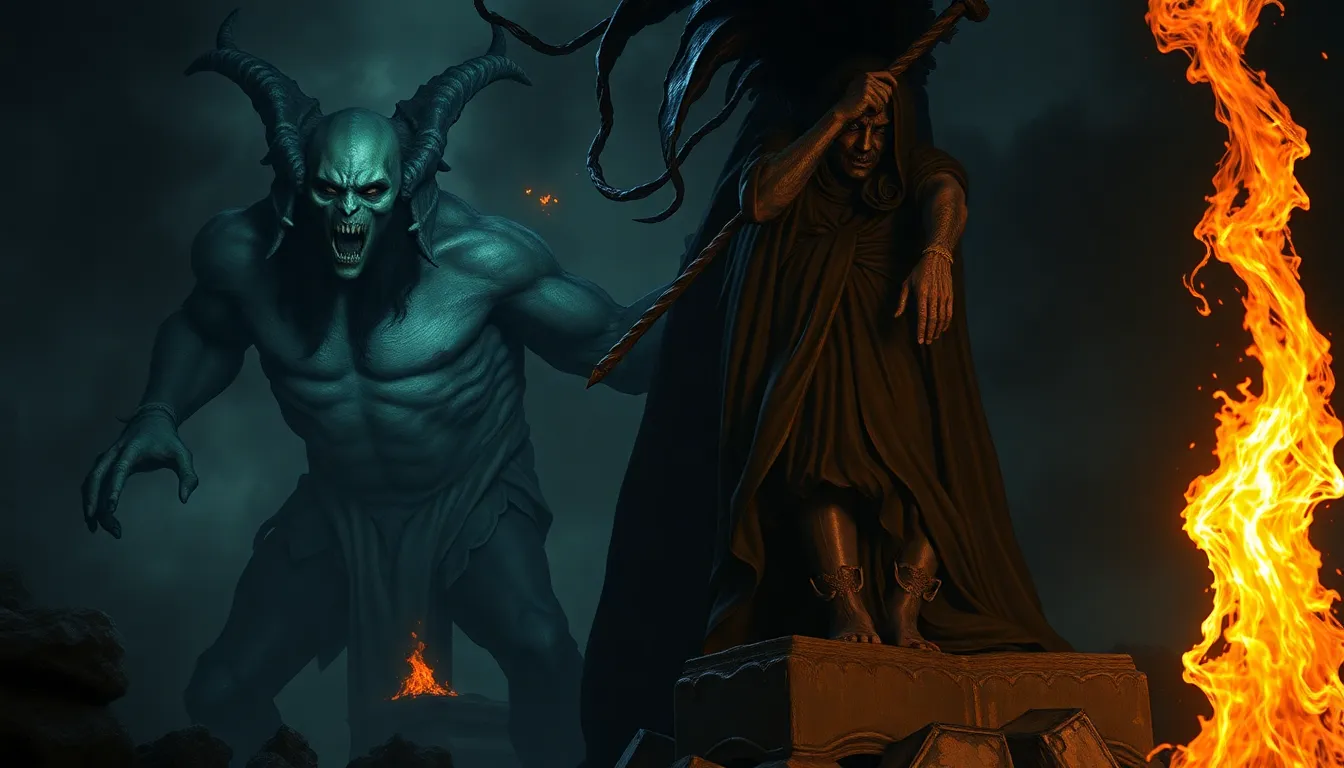Cursed by Fate: The Most Notorious Punishments in Mythology
I. Introduction
Throughout history, mythology has served as a mirror reflecting human behavior and societal values. Central to many mythological narratives is the concept of fate, often intertwined with the idea of divine punishment. In these tales, the actions of mortals are scrutinized, revealing a cosmos governed by higher powers that administer justice to those who transgress moral laws. This article aims to explore notable myths of punishment, delving into the stories of figures like Prometheus, Sisyphus, Medusa, Tantalus, and Ixion, and examining the broader implications of their fates.
II. The Nature of Divine Punishment
Divine punishment in mythology serves as a crucial mechanism for enforcing moral order. It acts as a warning to mortals about the consequences of their actions, often manifesting in harsh and imaginative ways. The significance of these punishments lies in their ability to convey lessons about humility, respect for the gods, and the inevitability of fate.
In many myths, gods are depicted as arbiters of justice, using punishment to maintain balance in the universe. Common themes in mythological punishments include:
- Retribution for hubris or arrogance
- Consequences of deceit and betrayal
- Transformative experiences that lead to enlightenment or suffering
III. Prometheus: The Titan Bound to Eternal Suffering
Prometheus, a Titan known for his intelligence and cunning, defied the gods by stealing fire and giving it to humanity. This act of rebellion against Zeus was perceived as a grave offense, leading to a severe punishment. Prometheus was bound to a rock, where each day an eagle would descend to feast on his liver, which would regenerate overnight, forcing him to endure this torment for eternity.
The symbolism in Prometheus’s story is profound; he embodies the struggle for enlightenment and the sacrifices made for the betterment of humankind. His punishment serves as a reminder of the consequences of defiance, but also highlights the importance of knowledge and the human spirit’s resilience.
IV. Sisyphus: The Eternal Struggle Against Fate
Sisyphus, the cunning king of Corinth, was notorious for his deceitfulness. He tricked the gods multiple times, ultimately leading to his punishment: rolling a massive boulder up a hill, only for it to roll back down each time he reached the summit. This eternal struggle has become a symbol of futility and the human condition.
Sisyphus’s plight raises existential questions about the nature of life and the meaning of struggle. His punishment, while seemingly absurd, prompts us to reflect on our own struggles and the perseverance required to confront life’s challenges.
V. Medusa: The Transformation into a Monster
Medusa, once a beautiful maiden, was cursed by Athena as punishment for being violated by Poseidon in her temple. Transformed into a Gorgon, she became a monster with snakes for hair, capable of turning anyone who gazed upon her to stone. This transformation reflects themes of victimization and the harsh consequences of divine wrath.
Medusa’s legacy in art and culture is complex; she has been interpreted as both a monster and a tragic figure. Her story highlights the intersections of power, gender, and societal judgment, serving as a powerful symbol of transformation and the consequences of divine punishment.
VI. Tantalus: The Torments of Desire
Tantalus, a favored mortal of the gods, committed several offenses, including stealing ambrosia and attempting to deceive the gods by serving them his own son. As punishment, he was condemned to stand in a pool of water beneath a fruit tree, eternally hungry and thirsty. Whenever he reached for the fruit, it would recede out of reach, and when he bent down to drink, the water would vanish.
This punishment embodies the themes of temptation and the dire consequences of hubris. Tantalus’s eternal yearning serves as a cautionary tale about the dangers of greed and the insatiable nature of desire.
VII. Ixion: From Hero to Hades
Ixion was initially honored by the gods but fell from grace after he betrayed the hospitality of Zeus. His punishment was to be bound to a fiery wheel that spun endlessly in the Underworld. This tale serves as a stark reminder of the importance of respect and gratitude towards others, especially in matters of hospitality.
Ixion’s fate raises moral implications about loyalty and betrayal, illustrating how even the most favored can fall from grace due to their actions.
VIII. The Fates: Weavers of Destiny and Punishment
The Fates, known as the Moirai in Greek mythology, are the personifications of destiny. They control the life span and fate of every mortal, weaving the threads of human lives with precision. Their role in determining punishments is significant, as they ensure that the consequences of one’s actions are meted out justly.
Examples of figures punished through the threads of fate include:
- Atreus, who faced familial curses
- Oedipus, whose fate was sealed by prophecy
- Agamemnon, who suffered for his hubris
The Fates remind us that while individuals may strive for autonomy, the underlying thread of fate often governs their outcomes.
IX. Comparative Analysis: Mythological Punishments Across Cultures
Mythological punishments are not confined to Greek mythology; they appear in various cultures around the world. For instance:
- In Norse mythology, Loki faces a punishment of being bound with his children’s entrails, with a serpent dripping venom onto his face.
- Egyptian mythology features the judgment of souls, where the heart is weighed against a feather; a heavy heart faces dire consequences.
- In Hindu mythology, the cycle of karma dictates that one’s actions in life lead to appropriate punishments in future incarnations.
Across cultures, these myths share similarities in themes of justice, morality, and the consequences of human actions. However, they also reflect unique cultural values and beliefs, illustrating the universal human experience of grappling with fate and morality.
X. Conclusion
The exploration of notorious punishments in mythology reveals not only the creativity of ancient storytellers but also the enduring lessons they impart. From Prometheus’s eternal suffering to Sisyphus’s relentless struggle, these myths serve as cautionary tales about the consequences of human actions, the complexities of fate, and the moral fabric that binds societies together. As we reflect on these stories, we gain insight into the human condition and the intricate relationship between our choices and the forces that govern our lives.




